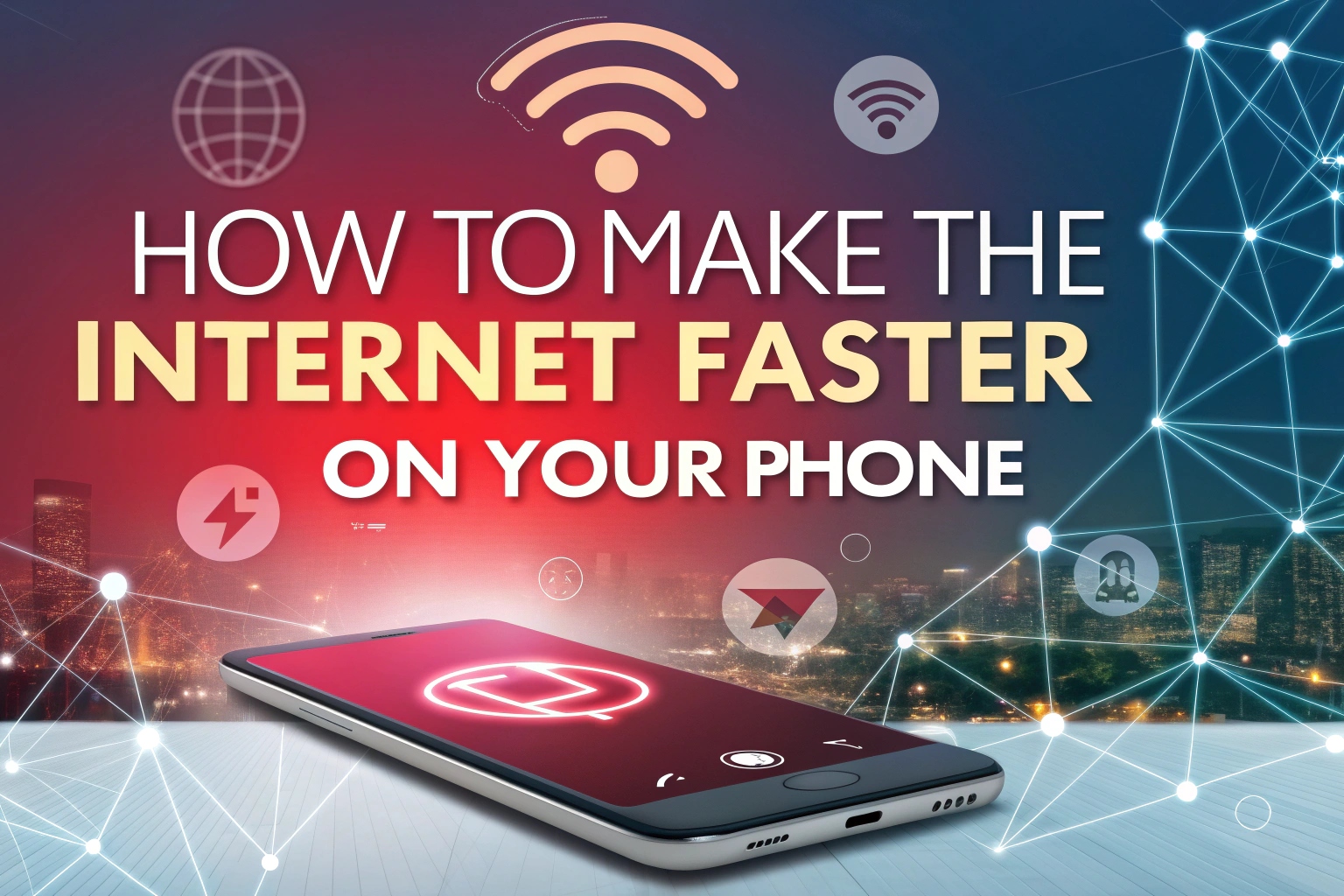How to Make the Internet Faster on Your Phone 📱⚡
Slow page loads, buffering videos, or sluggish apps? 😣 Your phone’s Internet speed can falter over time, but you don’t need a new device to fix it! This guide offers simple and advanced steps to boost your mobile browsing speed, improve performance, and enhance privacy. 🚀 Let’s make your Internet zip! 🏎️
Understanding Mobile Internet Speeds: 3G, 4G, and 5G 🌐
Your phone’s Internet speed depends on its cellular standard (3G, 4G, or 5G), which indicates the generation of mobile network technology, not a fixed speed. 📡 Here’s what each offers:
- 3G: 0.5–5 Mbps (megabits per second) for downloads. 🐢
- 4G: Up to 100 Mbps, ideal for streaming and browsing. 🚗
- 5G: Up to 100 Gbps (gigabits per second) in theory—100x faster than 4G. 🚀
Note: Actual speeds vary based on signal strength, network congestion, and your plan. Use a speed test app (e.g., Ookla Speedtest) to check your current speed against your provider’s claims. 📊
Step 1: Check Your Internet Plan and Signal Strength 🔍
Before tweaking your phone, ensure you’re getting the best connection:
- Verify Your Plan: Confirm you’re on the highest standard available (e.g., 5G if supported). Contact your provider if you’re stuck on 3G/4G in a 5G area. 📞
- Check Signal Strength: Look at your phone’s signal bars or run a speed test. Weak signals (1–2 bars) slow your connection. 📶
- Fix It: Move to an area with better coverage, use Wi-Fi, or consider a signal booster for home. 📡
- Restart Your Phone: A quick reboot can refresh your connection. 🔄
Step 2: Troubleshoot Your Home Wi-Fi Connection 🏠
If your phone slows down at home but works fine elsewhere, your Wi-Fi may be the issue:
- Restart Your Router: Unplug it for 30 seconds, then plug it back in to reset the connection. 🔌
- Check Modem and Cables: Ensure all cables are secure and the modem is functioning. 🔧
- Run a Speed Test: Use Ookla or Fast.com to measure Wi-Fi speed. Compare to your plan’s advertised speed. 📊
- Optimize Setup:
- Move closer to the router to reduce interference. 📍
- Disconnect unused devices to free bandwidth. 📱
- Upgrade to a modern router (e.g., Wi-Fi 6) if yours is outdated. 🆙
- Change Wi-Fi Channel: Use a Wi-Fi analyzer app to find a less crowded channel, reducing interference from neighbors. 📡
Step 3: Manage App Data Usage 🧩
Apps can hog bandwidth, slowing your Internet. Here’s how to take control:
Find Data-Hungry Apps 📈
- On iOS:
- Open Settings > Cellular or Mobile Data. 📱
- Scroll to see data usage per app (e.g., YouTube, TikTok). 📊
- On Android:
- Open Settings > Network & Internet > Data Usage > Mobile Data Usage. 📱
- View app data consumption over time. 📈
- Action: Uninstall unused apps or restrict data-heavy ones. 🗑️
Delete or Restrict Apps 🚫
- Uninstall:
- iOS: Settings > General > iPhone Storage, tap an app, then Delete App. 🗑️
- Android: Settings > Apps, select an app, tap Uninstall. 🗑️
- Restrict Data:
- iOS: Settings > Cellular, toggle off data access for specific apps. 🚫
- Android: Settings > Network & Internet > Data Usage > Mobile Data, disable data for apps. 📴
- Beware: Avoid old or copycat apps—they may steal data and bandwidth. Use trusted apps from the App Store or Google Play. 🛡️
Step 4: Optimize Background Processes ⚙️
Background apps (e.g., social media, maps) consume data and slow your Internet.
Restrict Background Processes 🚀
- On iOS:
- Open Settings > General > Background App Refresh. 📱
- Toggle off for non-essential apps or disable entirely. 🚫
- In Settings > Cellular, limit apps’ cellular data access. 📴
- On Android:
- Open Settings > Apps, select an app, tap Data Usage > Allow background data (disable for unused apps). 📱
- For advanced control, enable Developer Options:
- Go to Settings > About Phone, tap Build Number 7 times. 🔓
- In Settings > Developer Options, set Background process limit to fewer processes. ⚙️
- Pro Tip: Check apps with location access (Settings > Privacy > Location Services) and disable when not needed. 📍
Step 5: Optimize Phone Settings for Speed 🛠️
Adjust settings to minimize background data use:
- Disable Location Services: Settings > Privacy > Location Services, toggle off or set to While Using for apps. 📴
- Turn Off Auto-Downloads:
- iOS: Settings > App Store, disable App Downloads and In-App Content. 📱
- Android: Google Play Store > Menu > Settings > Auto-update apps > Over Wi-Fi only or Don’t auto-update. 📲
- Limit Push Notifications: Settings > Notifications, disable for non-essential apps to reduce data pulls. 🔔
- Enable Data Saver:
- iOS: Settings > Cellular > Data Mode > Low Data Mode. 📴
- Android: Settings > Network & Internet > Data Saver, toggle on. 📱
- Reduce Animations:
- iOS: Settings > Accessibility > Motion > Reduce Motion. 🎥
- Android: Developer Options > reduce animation scales. ⚙️
Step 6: Reset Your Phone (Last Resort) 🔄
If nothing works, a factory reset restores your phone to its original state, potentially fixing software-related slowdowns.
- Backup First: Save data to iCloud (iOS) or Google Account (Android).
- iOS: Settings > [Your Name] > iCloud > iCloud Backup > Back Up Now. 💾
- Android: Settings > System > Backup > Back Up to Google Drive. 💾
- Note: Backups may take hours depending on data size. Use Wi-Fi and a charger. 🔌
- Reset:
- iOS: Settings > General > Transfer or Reset iPhone > Erase All Content and Settings. 🗑️
- Android: Settings > System > Reset > Factory Data Reset. 🗑️
- Restore: After resetting, sign in to restore backed-up data. 🔄
Step 7: Use a Fast, Secure Browser Like iBrowe 🌟
Your browser is a major factor in Internet speed. iBrowe transforms your browsing:
- Blocks Ads and Trackers: iBrowe Shields skip data-heavy ads and trackers, reducing page load times. 🚫
- 3x Faster Loads: Up to 3x faster than Chrome, saving data and battery. ⚡
- Privacy First: No tracking of your history or searches, with Tor integration for anonymity. 🕶️
- Extras: Private search, offline playlists, and rewards for browsing (opt-in). 💰
- How to Switch:
- Download iBrowe from the App Store or Google Play. 📲
- Set as default: Settings > iBrowe > Default Browser App (iOS) or Settings > Apps > Default Apps > Browser (Android). ⚙️
Extra Tips for Faster Mobile Internet 🏎️
- Clear Browser Cache:
- iOS (Safari): Settings > Safari > Clear History and Website Data. 🌐
- Android (Chrome): Chrome > Menu > History > Clear Browsing Data. 🗑️
- Use Wi-Fi Over Cellular: Wi-Fi is often faster and saves data. 📡
- Update Your OS: iOS: Settings > General > Software Update. Android: Settings > System > System Update. 🆙
- Check for Malware: Use antivirus apps (e.g., Malwarebytes) to remove data-hogging threats. 🦠
- Upgrade Your Plan: If speeds remain slow, ask your provider about faster plans or 5G options. 📞
Why It Matters 🌍
Slow Internet isn’t just annoying—it wastes time and can expose you to privacy risks via data-hungry apps. 🕵️♂️ By optimizing your phone and using iBrowe, you’ll enjoy faster browsing, longer battery life, and better security. 💪
Download iBrowe today for a blazing-fast, private Internet experience! 🚀 Join the iBrowe Learn Community on Lemmy to share speed and privacy tips! 💬


